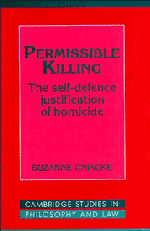Book contents
- Frontmatter
- Contents
- Acknowledgements
- Chapter 1 The problem of homicide in self-defence
- Chapter 2 Self-defence as a justification
- Chapter 3 Self-defence and natural law
- Chapter 4 The Double Effect justification
- Chapter 5 The right of self-defence
- Chapter 6 Self-defence and the right to life
- Bibliography
- Index
Chapter 2 - Self-defence as a justification
Published online by Cambridge University Press: 01 March 2011
- Frontmatter
- Contents
- Acknowledgements
- Chapter 1 The problem of homicide in self-defence
- Chapter 2 Self-defence as a justification
- Chapter 3 Self-defence and natural law
- Chapter 4 The Double Effect justification
- Chapter 5 The right of self-defence
- Chapter 6 Self-defence and the right to life
- Bibliography
- Index
Summary
The claim that homicide in self-defence is justified killing will strike many people as obviously true. Nevertheless, this claim is contestable and the details of its defence are more complex than is often supposed. Hence, the first section of this chapter is concerned with the nature of justification and excuse, the conditions under which the plea of self-defence is a justification of homicide, and the type of justification self-defence is. Homicide in self-defence is also commonly taken to be legally justified homicide; the legal plea of Self-Defence is usually said to be a justification. In the second section of this chapter (2.2) I argue that although the general characterization of homicide in self-defence as justified is essentially correct, it is not entirely straightforward and this is partly due to the complexity of the moral background. Towards the end of the chapter I discuss aspects of the law of self-defence which complicate or to some extent undermine the claim that the conditions of the legal plea of Self-Defence are those of justification.
SELF-DEFENCE AND THE COMPLEXITY OF JUSTIFICATION AND EXCUSE
In everyday moral evaluation many people use the terminology of justification and excuse loosely without, for instance, differentiating between excusable and justified conduct. Even when we endeavour to be precise there can be legitimate doubt about whether a particular explanation justifies rather than excuses a person's conduct. J. L. Austin, for example, questions whether provocation is an excuse.
- Type
- Chapter
- Information
- Permissible KillingThe Self-Defence Justification of Homicide, pp. 9 - 56Publisher: Cambridge University PressPrint publication year: 1994

